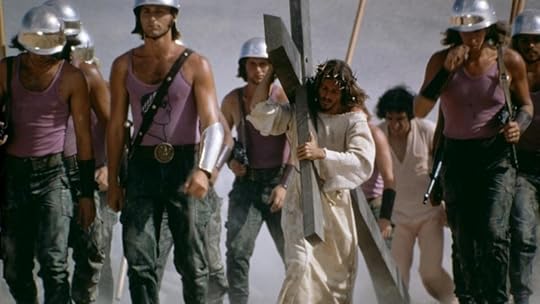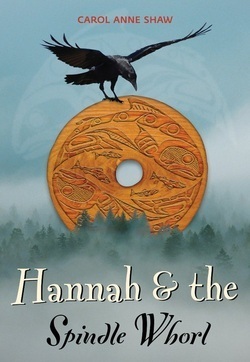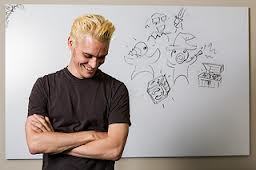James Funfer's Blog, page 5
January 29, 2015
Broadway Fantasy Draft
So I was listening to this record the other night:
…which got me to thinking about a few things. Specifically, how much I miss performing musical theatre (or theatre in general, really) and how much I’ve enjoyed various iterations of JCS:
The Broadway version:

The Movie Version:
and the 2012 UK revival:

…you may think it odd, perhaps, for an out-of-the-closet atheist to be into something so heavily religious, but I have to say that one of the things that sticks with you when you are raised Roman Catholic is the lore. Things like the stations of the cross and the idea of angels are very deeply ingrained in the ‘western’ psyche. And mine.
Then you have the score: a rock opera inspired by various types of worship music, setting the stage for a fictionalized account of Jesus’ final week of life, including some heavily non-canonical interplay between Jesus and Judas Iscariot.
…seriously, if you’ve never listened to/seen Jesus Christ Superstar, do so. Now.
If you have, then you might know where I’m coming from.
Back to the point: my wistful daydreams of performing or directing have produced more than one fantasy concerning how *I* would stage a production of something like Jesus Christ Superstar.
…not that I have the requisite experience with directing. Or a musical director. Or a rock band slash orchestra at my command. Which is why I give you…
Ultimate Broadway Fantasy Draft 2015!
…I was going to make a Hockey: the Musical joke, but apparently it’s already a thing:

So here’s my imaginary production of Jesus Christ Superstar:
-We open on a dystopian science-fiction desert set which is somewhere between Woodstock, Mad Max and a Margaret Atwood novel (no sand though! One of my profs in university once told me that sand is a nightmare to clean up on a stage).
-Jesus, Judas and Mary are all played by women. (I guess we can call her Judith?) Jesus looks like a young Joni Mitchell, Judas something akin to Katniss Everdeen. Mary Magdalene is, in essence, Tina Turner.
-The Romans are an alien race enslaving humanity. They look like griffins:
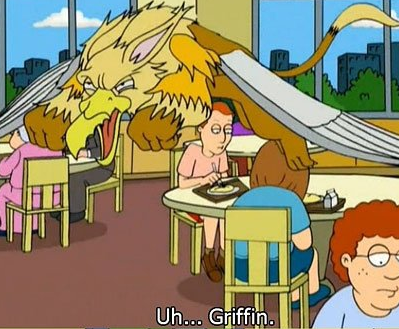
…stay with me here, I’m going somewhere with this.
…no, really! The inestimable Neal Patrick Harris as King Herod (he was fantastic as Hedwig, by the way):
-Anna Kendrick as Mary, Idina Menzel as Judas (Judith?), Freema Agyeman as Jesus (can she sing? I like to believe so).
Judas’ lament of practical matters vs. spirituality, Jesus’ views, these things become something else entirely in the face of a domineering alien presence. What is humanity’s place in the cosmos, and in the sight of god?
…but more importantly, David Bowie must reprise his role as Pontius Pilate:
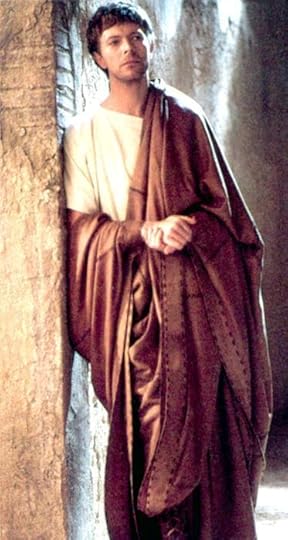
…yes, I know that’s from a different Jesus movie. But it’s DAVID BOWIE! Plus he’d be in a griffin costume. What’s not to like?
So there you have it: my bizarre, imaginary contribution to theatre. It’s a game the whole family can play! What piece of theatre would you produce? Who would you cast, and what would it look like, if your budget was limitless? Leave me a comment!
Coming next week: a new short story and an update on Crystal Secrets. Stay tuned.
January 20, 2015
Sneak Preview: Crystara
As promised, here is Crystara’s first chapter from Crystal Secrets.
Crystal Secrets: Chapter 4
Crystara dreamed of deaths and desires, of a mother she never knew and a lover she once thought she knew. Sometimes her father chased her through the hallways of the Old Temple, screaming and cursing, clutching a whisky bottle. Sometimes he morphed into Jacoby. Worse were the dreams about Lenara, who merely shuffled after her, saying nothing, staring at her with milky, accusing eyes. In those dreams Crystara’s feet were made of stone, laden and heavy. The chase was as slow as a funeral dirge, but Crystara always woke up screaming when Lenara’s cold hand clutched the back of her neck.
When she awoke she would find herself back in her dungeon cell. Sometimes the cold tedium was worse than the nightmares. Crystara’s gaoler, a mute man with a club foot, took no notice of her cries. A thorough pilfering of his mind revealed that he knew little of what truly went on in the temple and understood even less than that. He was the perfect man for the job.
At least once a night Crystara dreamed about the gallows. Faceless men would lead her up to the wooden platform. She was always naked, and there was usually a crowd gathered to watch her swing from the rope. The mob would throw stones at her as they shouted, so loudly that Crystara couldn’t hear the charges being read by the executioner.
She always tried to struggle, but Jacoby was there at the front of the crowd. He had a crystal ring on his finger, and when he pointed it at her she couldn’t move. The executioner put the rope around her neck and drew the noose tight. When he pulled the lever and she felt her feet drop out from under her, Crystara caught a glimpse beneath his hood.
It was Keeper Orvin.
In moments of solitude the guilt crept into her heart. Lenara had deserved her fate, as far as Crystara was concerned, but what gnawed at Crystara was the look of shock she’d seen on Keeper Orvin’s face. In the nightmare she tried to tell him that it was an accident, but she was already swinging from the rope by then.
Crystara reminded herself cynically that Orvin was no less dead just because it was an accident.
She began to lose track of days and nights. From the hunger pangs she assumed they were only feeding her the same cold, bleak gruel once a day, but she’d forgotten to keep track of the first few days since she’d assumed her death was imminent.
The new keeper came to visit after five more bowls of gruel had passed her lips. The dove-white robes of office seemed ill-fitted upon him, hanging off his stooped, wiry frame.
“I took a look at your ring,” he said in his raspy tone. There was something about the way he looked at her when he held out the clear crystal band that made her flesh crawl.
“It’s not mine anymore,” she replied, glaring at him from the far corner of her cell.
“You’ll put it on,” he said, “or I’ll make you.”
Crystara didn’t budge. The man’s smile was sallow.
“Knights,” he called. From the shadows came three rough-looking men, dressed in travelling clothes. They appeared more like brigands than knights to Crystara, and as they approached her cell the stink of horses was almost overwhelming. One of them produced a key.
She shut her eyes and focused, rifling through their minds as the cell door swung open. Their task was not to harm her, simply to stop her from escaping and force her to wear the ring. Not even they knew what the ring did, and Keeper De’Cadomus’ mind was as iron-clad as it had been the last time Crystara had tried to read him.
The threat of the ring was bone-chilling in a way that a death sentence would never be. Without a crystal to defend herself with, Crystara knew that her only option was to make a run for it.
She managed to slide under the legs of the tallest one, but as she reached the threshold of the cell she saw one of De’Cadomus’ crystal rings glow yellow and she was thrust backward into the arms of the men. Crystara screamed and flailed but their grips were as firm as shackles.
She squirmed and balled her hands into fists, but the third knight pried her left hand open and forced the ring onto her big finger. The men unceremoniously dumped her onto the deepstone floor and left. De’Cadomus glowered down at Crystara as she stood up and rubbed her wrists.
“You’re a powerful speaker, Crystara, but you’ll never…”
Crystara clutched the ring and pulled. A crippling shock of pain shot through her body and she was forced to her knees. She bit her lip and tried again. This time the spasms sent her to the floor as she screamed.
“You fucking bastard!” She sobbed.
“Consider this insurance. You’re no good to me locked up all the time, but I can’t have you…”
Crystara leapt to her feet and threw a wild punch at the keeper. He stood his ground and the punch never connected. When Crystara’s fist got close to his face, the ring on her finger glowed deep amber and she was thrown backward.
“There are quite a few things Orvin didn’t teach you, it seems. The ring once bound you to a betrothal. Now it binds you to me. You will do as I say, or that crystal will cause you unimaginable pain. If you try to leave the temple, it will hurt you as well.”
“Fuck you,” she sobbed. De’Cadomus shut the door to Crystara’s cell and stared at her through the bars.
“A young mute orphan is going to come to work for the temple. The Church of the Great Crystal looks after the unfortunate of society…even lame mutes can serve the gods.” He gestured to the gaoler, who looked on passively. “This dumb urchin might believe that she can speak, but all people will hear are disturbing moans when she opens her mouth. Few will choose to even look upon her, for her face is misshapen and hideous.”
Crystara stared in disbelief at the ring on her finger. She’d never heard of crystals doing that kind of thing. What did De’Cadomus know? She wondered if she could read his mind when he was asleep. Had Keeper Orvin known those alignments, too?
“Should that ugly mute serve the church well, perhaps she will be allowed a small measure of freedom…but she must never forget that she belongs to the Great Crystal.” Again, stabbing pains shot through Crystara’s body and she writhed on the marble floor in front of De’Cadomus. “You may prove your loyalty to me with time, but only my death will remove your fetters. You may think yourself a killer, but you do not have what it takes to kill me. Simpering bookworm keepers and young ladies are one thing…”
Crystara strained to hear the word that he whispered as he stared at her crystal ring, but it was nothing more than a puff of air to her. She shook spasmodically as the pain coursed through her body, and tasted the tang of blood in her mouth. When the pain subsided, she opened her eyes. De’Cadomus was gone, and she was alone again in her cell.
October 19, 2014
Sneak Preview: Prologue
Paulo heard the sound of bells tolling far away. The pealing, brassy tones were muffled by layers of stone and wood. Deep under Crystus Hill, Paulo was surprised that he could hear them at all. He took another shuffling step and ascended a marble stair in complete darkness.
Every time he moved, the pain in his guts stabbed at him. Ignore it, he told himself. You are strong. You are the son of Maximus Longoro, an Emperor of Novem. The crystal can heal you. The nation is counting on you. You’re going to marry Racquela and…
“Ugh,” he groaned, clutching at his side. The thought of Racquela gave him strength and he kept moving.
The bells grew louder as Paulo ascended, filling the silence between his grunts and footsteps. He wondered how long it would take for somebody to find his corpse if he didn’t reach the top.
A stabbing pain from his wound brought Paulo to his knees. He collapsed on the cold marble stairs and tried not to slip on his own blood. Paulo thought about crying out for help. He didn’t know if anybody would hear him, or if the right kind of help would come. A lot of people wanted him dead, and his loyal followers were far away.
“Shatters,” Paulo whispered. A cry for help would have taken too much out of him. He was spending the last of his strength keeping a foot wedged on a lower stair, pinned there to stop him from sliding. The steps were steep, treacherous to the unwary. The darkness and Paulo’s growing dizziness made it worse.
Paulo pushed himself up and stood on shaky legs, leaning against the central column of the stairwell. He returned a hand to his gut to cover the wound, pushed his sweat-slick hair back from his face and braved another steep step. He was the heir to the Empire of Novem; he refused to die ignobly in a forgotten staircase, reeking of sewers and viscera.
I am not going to die, Paulo told himself as he took another step. Shatters, where is that door? This staircase goes on forever.
Other sounds began to mingle with the ringing of the bells. Shouting and wandshot were distant but audible. Paulo smiled wolfishly in the dark. He was getting closer, and so were his rebels.
Paulo’s forehead struck something abruptly. He nearly lost his balance, steadying himself against the staircase column. He searched frantically for a doorknob or latch, but the surface in front of him was smooth and featureless. His staircase to the temple had been walled off long ago.
“No,” he said weakly. The bells replied forlornly. Paulo’s legs gave out and he slid against the wall to collapse upon the final stair. Out beyond the walls of the Old Temple, brave men and women were fighting to overwhelm the army and take the parliament building. They were fighting, unaware that their future emperor, the salvation of Novem, was dying.
October 16, 2014
The Nine Sons of Novem
Good news! The sequel to Crystal Promise is now in the editing phase. I will be posting a nail-biter of a preview to this blog in a day or two. Today, I thought I’d share with you a parable detailing Novem’s caste system and class struggle. This and other ‘flavour-text’ style short pieces will be featured between certain chapters, and I will *potentially* be recording a pair of radio plays and uploading them to YouTube: Crystal Captain and Speaker for Hire.
‘The Nine Sons of Novem’
Once upon a time there was a wealthy duke with nine sons. One day, the duke brought his sons to the top of his tower and showed them the virgin, untamed land around the estate. He told them that when they became men, they would each earn an inheritance: one ninth of the duke’s wealth.
When the first son was a man, he used his inheritance to buy up vast parcels of land, and so he and his wife and children became farmers. ‘Thus will I feed my younger brothers,’ said he, for as the eldest, he was a responsible provider.
The duke warned him, however, that his brothers would take advantage of his generous nature.
When the second son came of age, he spent his wealth on tools of iron and went into the mountains, for as the second-born he naturally sought to become more successful than his older brother. ‘Here shall I find the riches of the earth,’ said he, ‘and my older brother shall feed me so that I may work uninterrupted.’
And the duke warned him that a nugget and a coin are not the same thing.
When the third son was old enough, he used his money to buy tools of crafting, for he looked up to his elder brothers who worked with their hands, but he had the heart of a creator. When the second brother complained that his hard work was going to rust, the third brother said: ‘I will pay you to work, brother, and I will pay the eldest to feed you, if I may take what you have and build to my heart’s content.’ And with the riches of the mountains he bought from his brother, he built a great city, and many people paid him for his houses, and so he became wealthier than his older brothers.
But the duke warned him that city walls do not protect against greed.
When the fourth son earned his inheritance, bandits came from the forest and besieged the city the third son had built. The fourth son asked the third son to build him weapons and armour, and then he went out and slew the bandits, and his brothers were thankful. ‘You must pay me,’ said he, for though he was brave he was also practical. ‘I am risking my life to protect your fields, mines and city.’
His brothers paid him to keep them safe, and he became wealthier than they, so wealthy that he had the third brother build him a fine fortress in the centre of the city.
Then the duke warned him that his brothers would not need him during a time of peace, and would become wealthier than he.
When the fifth son was given his gold, he saw how busy his older brothers were, and how they did not have time to enjoy the fruits of their labours. So he bought a horse and cart and offered to take their goods to the next city to sell.
By selling his brothers’ goods, he became wealthier than they, for he earned more gold in the sale than the goods were worth, and he brought back exotic things to sell. His house was larger than the fortress in the centre of town.
The duke warned him, however, that his younger brothers would find a way to outdo his wealth.
Now the sixth son was not hard-working or brave or cunning, but he had spent his childhood observing the world and he knew many things, and there came a time when his elder brothers’ goods no longer fetched a fair price, and all the brothers were in danger of losing their wealth. So they all went to the sixth brother and said: ‘you understand the world. How do we save our wealth?’ The sixth said: ‘why, we must create something new that people need.’ And he used his understanding of the world to make new things that were useful, and from his share of the profits he built a place where others could learn what he knew. For a time, he was the wealthiest of all his brothers.
The duke warned him, though, that not everyone understood the value of truth.
When the seventh son achieved independence, it was discovered that he was a crystal speaker. He took the knowledge of all his elder brothers and bound that wisdom into crystals. He went forth and conquered neighbouring nations with his power, and he had the wealth of an emperor, and he ruled over all his brothers.
But the duke told him that his fortune was forever fated to rise and fall along with his empire.
The eighth son, unlike his brothers, had no concern for material wealth. His share of the duke’s legacy was spent building a place of worship, atop the Great Crystal which spoke for the gods. Because not even the seventh son could understand the Great Crystal, the eighth son’s church became influential even beyond the borders of the empire, and thus became wealthier than the empire alone could ever be.
But the duke told the eighth son that the gods did not concern themselves with the folly of man.
Then came a time when the empire was beset by rival nations, and fell to their might, and the brothers and all they had built were reduced to poverty and ruins. Then the ninth and final son was given the ninth and final share of the duke’s estate. The ninth son looked to his elder brethren and said: ‘brothers, I shall use my wealth so that we may rebuild, provided each of you pays me a regular share of your wealth hereafter, and name me ruler. If you refuse, I shall take my wealth and leave you to ruin.’
And so the ninth son became the wealthiest and most powerful of all, without ever lifting a finger.
But the duke warned the ninth son that his brothers would forever resent him for what he had done.
April 29, 2014
Sneak Preview
As promised, here is a sneak peek at the sequel to Crystal Promise. Comments welcome.
***
Julio had forgotten how fresh the air could be outside of the city. Away from the smokestacks and grit and the smell of collective metropolitan sweat, he could feel life being infused into his lungs. On the open road, the wind burnt his cheeks and his lips curled up into a misshapen but honest smile. He couldn’t recall the last time he’d smiled like that; it was worth the occasional swallowed bug.
Roberto had never driven a motorcycle before, but he took to it like he did every other skill he tried his hand at, making the tight turns and switchbacks of the mountain roads look effortless. Drago drove much more recklessly, spinning his tires to spit up dirt and gravel, showing off by lifting the front tire on occasion, and whipping by Joveday drivers in their family ‘coaches by hugging the shoulder of the road. Julio would occasionally yell at Drago to be more careful, but if the young man heard him, he didn’t listen.
They set out north from Captus Nove, avoiding the wide, main road known as Sundus Motorway – at Julio’s suggestion they took the winding inner-country route known colloquially as the ‘Old Mine Road’, passing through small villages and alongside scenic upper-caste farmland estates. The day was brisk, but they had lucked out; the clouds were fleeting and there was little threat of rain.
Along the way, Julio would shout out historic anecdotes to Drago about the townships they passed, or the landscape – here at this bluff the barbarian tribes of Denlandia were held off by a meagre force of well-trained First Empire soldiers led by General Abritus, there the greatest crystal mine ever discovered gave up its last shard during the Fourth Republic, putting thousands of miners out of work. Whether Drago was truly listening, Julio couldn’t tell, but Roberto would occasionally add asides or ask questions.
They stopped on a pastoral hillside for lunch, snacking on cheese, sausage and a healthy few swigs of wine. Below, sheep grazed, and a weather balloon floated lazily overhead. Roberto examined both engines and brought out his loccimetre to check the resonance of the engines’ crystals.
“Bet you I could hit one of those sheep from here,” Drago boasted.
Roberto looked up from his device and shook his head. “What, by pissing off the cliff?”
Drago rolled his eyes. “No.” He rummaged in his pack and brought out a small wand. “With this.” He twirled it in his fingers dexterously.
Julio frowned. “We’re not shooting a farmer’s sheep.”
“Jova’s sake, dad.” Drago shut an eye and levelled his wand at a grazing ewe in the valley below. “What’s the point of this trip, if not to have fun?”
Julio and Roberto looked at each other. Roberto raised an eyebrow, as if to suggest that it was Julio’s task to mete out discipline.
Julio placed a hand on Drago’s wand and forced the barrel to point at the ground.
“The plan is to have fun, Drago, but that farmer relies on those sheep for his livelihood. Why don’t we make some stationary targets?”
Drago shrugged. “Sure…gotta use something you old guys can still hit.”
Roberto put his loccimetre away and lit a cigarette.
“Fuck you, kid. I was dropping soldiers before you were a twinkle in P…er, your pop’s eye. Worst shot has to buy the wine when we stop for the night.”
“A completely fair wager to the man with one eye,” Julio interjected. “The man who hasn’t shot a wand since he had to switch to his left.”
Roberto pointed to a set of old fenceposts down the hill.
“There. We can set up some stones and wager for best shot. Spook the sheep while we’re at it so you can get your kicks,” he suggested, looking at Drago. “And I know for a fact you didn’t lose your balls in the war, Jules, so quit whining. You were far from the worst wandman in the company.”
Julio grabbed a fist-sized stone and pretended that he was aiming to throw it at Roberto’s head.
“Says he who was second best.”
“Who was the best?” Drago inquired as he lit a cigarette of his own.
“Corporal Bocco,” Julio and Roberto said at the same time. Rocks in hand, they began clambering down the hill to the fenceposts.
“One of only four from our company to survive the war,” Roberto remarked. “Along with us and Largo Mita.”
“Largo’s in jail now, did you hear?” Julio said. He picked his way carefully down the slope, dragging his hook hand along the dirt for balance.
“He’s always in and out of there,” Roberto said. He began placing the rocks upon the fenceposts. “’Liza will never hold him, not while the Noctra can pay for his release.” He put out his cigarette on a post and began backing away from the rocks, one pace at a time. “They have bigger rocks to crack than one picker goon.”
Roberto stood thirty paces from the rocks and held up a thumb.
“What do you think, kid?”
“Too close,” Drago said. “Unless we’re blindfolded.”
Roberto chuckled and stepped back another twenty paces.
“There you go. The enemy is no longer in spitting range. What kind of crystal have you got on that wand, anyway?”
“Brown,” Drago said as he twirled the wand again. “Heavy grade precision stone, Noven officer’s issue. Same kind of crystal they use for the telescoped longwands.”
Roberto whistled.
“Shatters, we sure coulda used some of those in the war. They gave all the browns to us engineers for trenches and fortifications, but I would’ve been sent through the orange on the spot if I’d tried to re-appropriate crystals without a commanding officer’s express say-so. ‘Course, that didn’t stop us from getting Pip to re-align all the damn time by the end of the war. But then we were losing, so the officers were ready to try anything. Learned a lot more about tactics and crystals from our losses than our wins, that’s for godsdamn sure.” He looked at Drago. “Well, highest ranking soldier gets the first shot.”
Drago smirked, levelled the wand and took careful aim. Julio could tell even by the young man’s stance that he was a practiced wandman.
“Trench warfare is a thing of the past,” Drago muttered as he pulled the trigger. With a deafening crack, the first rock exploded into powder. Shooting Roberto a satisfied grin, he handed the wand to him.
Roberto glanced at Drago, then examined the wand. He seemed to be admiring its craftsmanship. Julio leaned in to note that Officer Drago Andari had been carved into the barrel, and that the grip was a custom carved fit designed to fit Drago’s hand. The republic certainly seems to favour its officers, Julio thought.
“Some of us were hoping that warfare in general was a thing of the past,” Roberto replied as he lifted the wand. He seemed to take a while to steady his hand. When he shot, however, his aim was true, and Julio heard shards of the rock scatter into the grass. The nearby sheep made a few noises of alarm and sought out a more placid section of pasture.
“Nice shot, old man,” Drago said. He turned to him. “If warfare is all in the past then why is the republic hiring soldiers instead of more pickers and planters?”
“Because there’s a drought,” Julio replied as Roberto handed him the wand. “Farmers are out of work and pickers are striking. The Rundia Accord nearly took our military away entirely. The fact that they didn’t means that the republic wants to ensure we still have one so that an opportunistic nation doesn’t try to get payback for the Great War, not to mention access to our crystal mines.” Julio took aim. Even at the best of times his hands were shaky, and holding a wand made it no different. In fact, it felt shakier. He could see them up ahead, brutish Parsish soldiers in their winter furs storming the trench, screaming the abyssal screams of those who knew they were about to die.
Julio opened his eyes and lowered the wand. There were no fur-clad soldiers, only woolly sheep grazing in the distance.
“What makes you say trench warfare is in the past?”
“Come on, Master Vellize, you’re the historian,” Drago replied. “You always said that wars were a series of trials and errors when it came to tactics, and the brilliant generals were the ones who challenged the status quo of what no longer worked. Well, what did we learn from the Great War? We had all the best crystal technology, but we dug ourselves into the dirt and played back-and-forth until one side broke. It was all about numbers. Then the Dennish got clever and borrowed non-crystal weapons from the Eastern Empire, which had limited ammunition but fired rapidly. It was incredibly effective in entrenched positions, and especially against massed charges. So when Denlund was freed and we lost the Parsish front, we broke hard.”
“That was Longoro’s fault for fighting on two fronts in the first place,” Roberto argued.
“Sure,” Drago agreed. “He should have taken out Faxon or arranged some kind of treaty with them. But any general worth his rocks these days knows that the future of warfare is in multi-layered assault.”
Julio gazed at Drago, the boy he pretended was his son. The boy he wished was his son. He’d given the lad too little credit; behind Drago’s braggadocio was a keen mind. He must have inherited that from Ramona, Julio told himself.
Roberto raised an eyebrow.
“Explain what you mean by multi-layered assault.” Julio could hear the interest in Roberto’s voice.
“I will,” Drago said, “if you explain to me why we have more crystals than any other nation but we’re still dirt-fucking-poor. Economics was never my colour.”
“Rundia Accord,” Julio offered. “Our currency is undervalued because we have to make reparations for the Great War. Granted, we still need to trade, so we still sell, and the other nations are reaping the profits from cheap crystals. So the republic limits trade, which isn’t helping given the depression, and the Noctra sell illegally and make millions of dinari.”
“You know they’re in bed with the republic,” Roberto added. “On the clear side, it means the Noctra are probably stockpiling crystals somewhere for when this godsdamned depression ends.” He popped a cigarette in his mouth and prodded Drago. “Your turn. Multi-layered assault.”
Drago gave his usual half-cocked grin.
“Uh-uh. Jules hasn’t shot yet. No military secrets until I know I’m talking to soldiers.”
Julio tried to suppress his sigh. Only the draft had made him a soldier. Only a lifetime of duskblossom and whiskey and work had separated him from the war, and even then, when he closed his eyes at night, sometimes he returned to those trenches. He had spent his whole life trying to escape that uniform, but Drago wore it with pride. He wondered what Pietro would think of it.
He raised the wand half-heartedly and glanced at the stone upon the post. His depth perception had never been the same since losing his eye; it was difficult to tell if the barrel was lined up with the stone. He’d spent a lifetime developing his left-handed penmanship, but wandsmanship was a different matter. Julio hated to admit it, but somewhere deep down he wanted to impress the boy. He shut out the distant sound of booming scattershot from his ears and pulled the trigger.
The rock didn’t move, but somehow there was still an explosive noise.
“Oh, fuck,” Drago said. “Nice shot, Jules.”
“So much for not hitting the sheep,” Roberto said with a snicker. Sure enough, one of the beasts had fallen over in the pasture, and a bright red stain spread out from its head in a circular pattern – or, what was left of its head. Cautiously, the three men approached the corpse. All that remained of its skull was a bottom jaw and some bits of bone and brain tissue. Julio began to feel ill. An image flashed in his mind – Pietro’s body twirling, thrown into the air by scattershot, blood spraying in a spiral.
“Hey!” came an irate voice from across the field, “what in Jova’s name are you doing to my sheep?”
The rancher had appeared at the other end of the clearing, brandishing a woodsman’s axe.
“Shit,” Drago said. “Run!”
If it hadn’t been for his lame leg, Julio would have felt nineteen again. They scrambled up the hill to the bikes like they were storming the next rise – full of fear, full of life.
April 10, 2014
Why I Write
For myself, of course. If I didn’t enjoy a task I wouldn’t do it (exception: cleaning house).
However, there’s something to be said for the power of the ego-stroke. If nobody tells you how much they enjoy reading your work and that they can’t wait for the next book, it can kill ambition just as surely as a lack of recognition at the office can affect your performance and engagement. For those of us not immune to the opinions of our fans and the general public, I believe that we write for ourselves and for others – fulfillment lies within the balance of delight in the process and the creation of something for others to enjoy. Like a gardener, we enjoy the planting season, but the warm fuzzies come from the family enjoying the fruits (and vegetables) of our labour.
Friend and fellow writer Carol Anne Shaw (of Hannah series fame) tagged me last week to pen a ‘Why I Write’ post. It’s easy for artists to forget, on occasion, that our process appears fascinating from the outside. I’ll skip the ‘silent anguish of staring at a computer screen’ part and talk about the things I like about writing:
WHAT ARE YOU WORKING ON?
Other than a couple of queries for a short story called The Winter Wife and my science fiction manuscript Chasing Lucifer, I’m currently focused on the sequel to Crystal Promise … which is, at the moment, untitled. We jokingly refer to it at my writing group as Crystal Something. I had a fleeting idea about holding a contest to name the book, but we all know how that goes.

Not pictured: “Hitler Did Nothing Wrong”
Since I’m not a fan of book II being dubbed “Crystal Meth”, I think I’ll wait until inspiration strikes before naming it.
Getting back on topic, the sequel picks up exactly where Book I of The Shattered Crystal series leaves off – in a steampunk-esque world reminiscent of depression-era Europe, the fallout of a series of arranged marriages has far-flung effects, further driving youths Timori, Crystara, Racquela and Jacoby into pandemonium. They find themselves at the mercy of the political schemes of friends, lovers, lower-caste led parties and a powerful church. The fabric of the nation of Novem, much like its central of power, the Great Crystal, threatens to shatter. As ancient secrets about the truth of the crystals themselves comes to light, a new power may well come to rise.
HOW DOES YOUR WORK DIFFER FROM OTHERS OF ITS GENRE?
I’ve always believed in the power of a character-driven story. While there is a fantasy element to The Shattered Crystal series, I was inspired by the historical events of early to mid-twentieth century Europe, as well as the kind of events that transpire in every teenaged romantic relationship. Instead of writing straight-up historical fiction or (so hot right now) urban fantasy YA, I went for a mash-up somewhere in the middle.
I’ve been told by fans that my characters are realistic and easy to relate to, and that the setting doesn’t seem outlandish or contrived. But don’t take my word for it.
WHY DO YOU WRITE WHAT YOU DO?
One could wax philosophical for quite some time about why artists ‘art’, but for writers I believe that we’re often drawn to whichever genre we prefer to read, and our work is peppered liberally with our unique set of interests. I love history, but I also love speculation … a “what-if” version of events is more exciting to me than working strictly through the lens of “what was and what is”. What if WW1 and WW2 had gone differently? What if the earth contained an alternate energy source that had been used since ancient times, pushing back the discovery of oil and electricity? What if you threw a bunch of teenagers into this world and see how they react to it all? Boom. Crystal Promise.
The original manuscript was written for a novel-writing contest (some of you may have heard this tale before…) and there were a few themes that I was very interested in exploring. As writers we tend to put a lot of ourselves into our work in some form or another, and given where I was at the time, the tribulations of young love needed to be examined. I wanted to express how messed up real relationships are – not just passionate, but complex and challenging and sometimes explosive. It’s cathartic, too, writing about what you know – it allows you to look at a familiar theme from an outsider’s perspective.
HOW DOES YOUR WRITING PROCESS WORK?
I think of my writing process as “linear and organic”. To elaborate, I tend to write from beginning to end (very unorthodox, I know), and I work under a fairly loose framework. That is to say, I don’t make a firm decision about major choices the characters are confronted with until the very moment in question. In allowing a character to react ‘organically’ to a situation, they often surprise me. I believe that this, in turn, allows the reader to more often be surprised by these choices as well, and makes for a “true-to-life”, character-driven story.
Up next I’m tagging Wanda S. Paryla, author of Someday Always Comes
…and stay tuned for a sneak preview of the sequel later this week!
December 3, 2013
Blah blah blog
Hello, all. I’ve been quiet on here lately, mostly because I’m plugging away at the sequel to Crystal Promise. And renovations. And work. And tabletop RPGs. And the new XCOM expansion. I’m still hoping to have a rough first draft finished by the end of 2013, at which point I will have lots of sneak previews to share will you, as well as some other blog ideas that I’ve been kicking around. In the meantime, there are a couple of other things that I wanted to share with you. The first is my aunt and uncle’s blog, Cruise of the Confidence
If you like travel blogs, this is your thing. They talk about the journey, but also the unique locations, sights and points of human interest, culture and history along the way. Currently they are in Mexico, and there’s a really great story about a statue posted on the 20th of November.
Second, there are a couple of webcomics I really want to share with the world. The first is Dresden Codak, which was introduced to me by one of the coolest people I know, David Baumgart of Gaslamp Games:
He and Megan Seely were also nice enough to make the beautiful cover art for Crystal Promise.
Anyway. The comic has this great thematic blend of art and storytelling. If I do a webcomic or graphic novel someday, I will definitely be citing Aaron Diaz as an influence.
The other one I wanted to talk about is a little bit different. The other one is LARP Trek.
It’s sort of a blend of Star Trek fan-service, tabletop role-playing discourse and picture/caption-based webcomic all rolled into one. This explanation might do a better job than I will: http://larptrek.com/2012/11/25/ensign-set-a-course-for-larp-trek/
Somehow, it works. It’s really funny, and it makes you think. You might have to be a fan of either Star Trek: The Next Generation or tabletop role-playing games to really appreciate it, but if you’re like me and appreciate both, it’s a riot.
So. Just wanted to share some things that I love with you. Back to doing horrible things to characters that I love.
–James Funfer
April 4, 2013
Radio Play
It was a quiet winter here on the blog, but I’m back. I’ve been typing away at the sequel to Crystal Promise (yes, I’m still juggling alternate titles in my head…unsure about Crystal Empire) and setting up book signings and new consignment venues for the spring/summer.
The most exciting bit of news, however, is that my girlfriend Kim is going to be on the radio this afternoon! Tune in to The Zone 91.3 in Victoria to hear her talk about Crystal Promise, musical influences and being a teacher, and listen very carefully for the subtext of how cool and awesome she is.
I’m also doing a book giveaway for the month of May, so if you’re interested you can sign up on goodreads.com and enter for a chance to win a free signed copy of Crystal Promise here.
I have a book signing scheduled for the 18th of May at Chapters Chinook in Calgary. Stay tuned for information about prizes I’ll be giving away, as well as a special sneak preview reading of Crystal Empire (working title)!
In the meantime, here’s another sneak preview of some of the work I’ve been doing. As you may or may not know, the world of Crystal Promise is loosely based on early 20th-century Europe, but some of the technology is different. Back in the days before television, radio plays were a very popular form of entertainment, and the family would gather around the radio to listen to an episode of The Shadow much in the same way that we get together to catch our favourite HBO and AMC dramas (minus those who download, of course). I’ve been working on some pieces to weave into the narrative of Crystal Empire. Inspired by radio plays, science fiction and WW1 dogfighting, I give you Crystal Captain:
Excerpt from the radio drama ‘Crystal Captain’
Episode 10 – ‘Rescue from Stormspeaker Station’
Narrator: Welcome back for another thrilling episode of ‘Crystal Captain’, the adventures of sky-speaker Captain Corvelius and his daring crew of skyship fliers. I’m your host with the most, Marius Ghost, here to bring you the next hair-raising, mind-shattering chapter.
Narrator: Episode Ten – ‘Rescue from Sky Station Alpha’. Tension condenses in the skies above the downtrodden nation of Neonovus. An uneasy ceasefire has been called between Neonovus and the Alliance of Kingdoms, but as the prime minister of Neonovus negotiates with the power-hungry kings for a lasting peace, many mercenary fliers have turned pirate and joined with the most nefarious pirate of them all – Captain Belzegor!
Narrator: Captain Corvelius, eager to keep his brigade’s skills shiny and protect the innocent from piracy, led a daring raid against Captain Belzegor’s hideout, the infamous Stormspeaker Station. However, a trap had been set for the First Sky Brigade, and Alliance fliers, disguised as pirates, assisted the roguish Belzegor. Outnumbered and overwhelmed, our hero and his friends fought bravely, but just as the good captain radioed to retreat and regroup, his skycraft was hit by scattershot. The last his brigade saw of him, he and his wrecked ship were hurtling toward the dock of Belzegor’s nimbus-fortress.
Narrator: Our scene opens in a stone jail cell with no windows. The bars are cold skyiron, harder than any steel we know of today. When we last left our hero, the dashing, handsome and capable Captain Caius Corvelius of the First Sky Brigade, he had been taken prisoner by the nefarious leader of the Storm Pirates, Captain Belzegor.
Corvelius: Urgh…these bars…stuck tight. No way out. Curse you, Belzegor! You’ll pay for this. All I can do now is wait and trust that my men will come and rescue me. But wait…the lock. It appears to be supercrystal. I’ll just get my amulet, and…
(Cue dramatic music)
Corvelius: Shards! My father’s amulet! It’s gone!
(Cue Belzegor’s theme. Sound of marching feet.)
Corvelius: Belzegor. You fiend!
Belzegor: Fiend? My dear captain, you were defeated, true as Tybal. There is no cause to throw insults, though I can certainly understand your shame, ha-ha-ha! How it must shatter you, to know that your proud airship was scattershot down by the very man who slew your father.
(Cue dramatic music)
Corvelius: Spare me your lies, pirate. Commander Cassius, my father, is on a mission of secrecy for the republic. And speaking of my father, what have you done with his crystal amulet, you dirty thief?
(Sound of a heavy metal chain)
Belzegor: Oh, you mean this amulet? I think it is becoming on me, don’t you, captain? You poor wretch. It seems as though there is nothing that I cannot take away from you. Your skycraft, your father, your family heirloom which is the secret to your power…
Corvelius: I tell you my father is alive!
Belzegor: Oh, but I just love being the bearer of bad news. I know all about the commander’s secret rendezvous with the king of Moonpeak Mountain. But I’m afraid he may have been…waylaid. Ah-ha! Ha-ha-ha-haaaa…
Corvelius: You lie!
Belzegor: Do I, captain? Then tell me, why would I have…this?
(Cue dramatic music)
Corvelius: But…it cannot be! My mother’s ring, companion to the amulet. Where did you get that?
Belzegor: Where else but from your father’s cold finger. Mua-ha-ha-haaaa…
(Cue dramatic music)
Corvelius: Nooooooo! It cannot be!
Belzegor: Well, I have gloated enough. There is plenty enough for me to do…hunt down your sky brigade to the last man, use the power of the amulet and the ring together to control the kingdoms and destroy your petty republic once and for all, that kind of thing. After that perhaps I’ll conquer the stars, who knows? Goodbye, captain. I’d let you join your mother and father in the abyss, but it’s so much better to watch you suffer. Ah-ha! Ha-ha-ha-haaaa…
(Sound of footsteps)
Corvelius: Jova curse you! Father…can it be true? I cannot believe that Belzegor would ever best you in a sky-tilt, but sure enough, there was the ring. I have failed you, father. The sky-amulet and earth-ring were bequeathed to mother and father so that lesser hearts would not be tempted by their power…and now they have both fallen into the hands of the worst kind of power-monger. But how did he ever discover father’s mission?
A woman’s voice: Are you going to talk to yourself all day? Some of us are trying to rot away in peace and quiet.
Corvelius: Who said that?
A woman’s voice: You’re brave, captain, but not too bright and clear, are you? I’m in the next cell over. My name’s Marquela.
Corvelius: Well, my lady Marquela, at least I’ll have some company while I wait for a rescue from the First Sky Brigade.
Marquela: You’re going to wait for a rescue? But Belzegor is surely setting a trap for any fliers who approach the station.
Corvelius: We already fell into a trap. They will not hesitate to rescue their captain.
Marquela: Well some of us can’t wait that long. Don’t you have a hidden crystal somewhere that can open the lock?
Corvelius: I did. It shattered when I used it to replace the seventh sky seal of Samalus.
Marquela: I heard once that you have a crystal button on your coat.
Corvelius: Ah, yes. I used it to defeat a moon-beast last year.
Marquela: And?
Corvelius: The beast swallowed it.
Marquela: I see. Well, I suppose I’ll have to do everything, then. If I toss something in front of your cell, can you reach through the bars and get it?
Corvelius: Yes, I believe so. What is it?
(Sound of a crystal falling on the ground)
Marquela: This.
Corvelius: A crystal earring? Why didn’t you say so?
Marquela: I just did, captain. Try not to shatter it; it was a gift.
Corvelius: Such a gift! Who are you, my lady, to receive such adornment?
Marquela: Can we just worry about escaping first? Gods, captain, less talking and more speaking.
Corvelius: Just a moment, my lady. And…there!
(Sound of rusty hinges)
Corvelius: And now, your cell.
(Sound of rusty hinges)
Corvelius: You are free!
Marquela: Please, announce it to the entire station.
Corvelius: My lady, some gratitude may be in order.
Marquela: Yes, you are very brave, captain. Those crystal locks didn’t stand a chance.
Corvelius: They were supercrystal, I’ll have you know.
Marquela: Ah, a mighty foe, then, for the captain of the First Sky Brigade. My earring, if you please.
Corvelius: My lady, I still have need of it. Otherwise we are defenceless.
Marquela: (Sigh) Lead on, then, captain.
Corvelius: I was unconscious when I was brought here. Do you know the way out?
Marquela: I suppose I must do everything. Follow me.
Narrator: And so, our hero and the saucy but beautiful prisoner Marquela traversed the cold, damp dungeon of Belzegor’s sky fortress. Dear listeners, let us pray that the captain’s wits hold out longer than his luck, for he is armed with only a tiny crystal from an earring…
Marquela: Look out! Guards!
Corvelius: Ignatio!
(Crystal sound effect. Sound of fire. Guards screaming.)
Corvelius: Quickly, now. I think they may be alerted to our presence.
Marquela: Unless screaming in agony is commonplace here. Take this wand and I’ll take the other. I think this is the dock. Where is your ship, captain?
Corvelius: Grievously damaged, my lady.
Marquela: We must take one of their ships, then.
Corvelius: What? Steal a ship? Why, I’d be no better than they are!
Marquela: You fliers and your honour. We don’t have much choice, captain.
Corvelius: But I…look out!
(Sound of explosions)
Marquela: Look! Fliers! They’re firing at the dock!
Corvelius: My lady! Take cover here!
(Sound of explosions)
Corvelius: It is my brigade. Come, we must join the fight. The pirates are taking to the skies.
Marquela: But if you take one of their ships, your brigade will fire upon you, thinking you to be a pirate.
Corvelius: We cannot remain here, the dock is ablaze!
(Cue Belzegor’s theme)
Belzegor: Not so fast, captain!
Corvelius: Quickly, Marquela. Into the flier, go! I shall hold him off.
Marquela: But…
Corvelius: Go!
Narrator: As Marquela climbs into a ship, Captain Corvelius holds a tiny crystal in his hand, preparing to face off with his nemesis, who now wields the greatest power on earth and in the sky! Can Marquela survive against the First Sky Brigade? Will Corvelius avenge his father’s murder? Tune in next Joveday, same time, for the next thrilling chapter of Crystal Captain! I’m your host with the most, Marius Ghost, bidding you a pleasant evening, listeners…
(Cue Crystal Captain theme)
October 29, 2012
Songs I Never Get Tired Of #1
http://www.youtube.com/watch?v=Q9hLcRU5wE4
Bat out of Hell
By: Meat Loaf
Well, this will come as no surprise to anyone who knows me, but to those who don’t…I’ll try not to spend this entire post defending Meat Loaf and Jim Steinman.
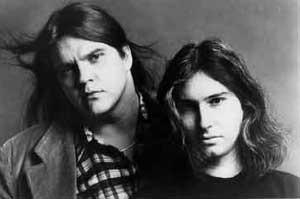
A Rocky Bromance: the early years
The tale of my love of all things Steinman began around 1989. I grew up in Alberta, but my mother’s side of the family lived mostly on Vancouver Island. In the summertime, we would take the Plymouth Voyager over the mountains to visit relatives. We only had a limited selection of cassette tapes, and for some reason avoided the radio (likely because on a long road trip, the stations would change frequently). Most of our choices were ‘Golden Greats’ tapes of ’50s and ’60s hits, a couple of ‘kid-friendly’ Disney tapes, and a cassette that had Hooked on Classics on one side and Jive Bunny on the other. However, there was one album we would all sing along to and never got sick of hearing. To cement the concept that Meat Loaf was a big influence upon my musical tastes, consider: at one point my family owned the Bat out of Hell album in three different formats: vinyl, cassette tape and CD.
The album opens with the ‘title song’, to a blaze of wailing Todd Rundgren licks, Wagnerian piano chords and free-flying tom-and-crash drums. I really don’t need to describe the song itself in full if you click on the YouTube link…but the impression I always get from that intro is summed up in a word that could describe a great deal of my musical favourites: epic. I find that word gets overused in the vernacular, but in this case it’s appropriate. Jim Steinman wrote epic music. Just look at his work with Bonnie Tyler or Pandora’s Box.
Now, one could argue that Steinman doesn’t write lyrics that carry the same amount of depth as some other artists, and I might be inclined to agree. That isn’t the point of this kind of music. Bat out of Hell (my interpretation) is a simple tale of a young bad-boy who loves a girl but needs to escape the deathtrap of Los Angeles, but during his pre-dawn motorcycle escape, he can’t get the girl out of his mind and crashes and burns. Or maybe it’s about a one-night stand where a guy convinces a girl to sleep with him (or is that more of a Paradise by the Dashboard Light thing?). The point is that the music can be grandiose in scale, but still carry a simple story that many can relate to (although admittedly with Meat Loaf, I imagine that men relate to it better than women…)
What makes this song my ‘Number One’ when there are so many soul-touching, world-changing, genre-bending songs out there? Familiarity, and a delight in the simple things. It’s a song that I will never get tired of, and I’ve heard it hundreds of times. I always hunger for new music, but there’s joy to be found in nostalgia. And hey, (yes I just started a sentence with a conjunction; deal with it) 43 million copies worldwide says something. This contemporary review (yeah I pulled it from a Wikipedia footnote, deal with it again) says it best: ”It may elevate adolescent passion to operatic dimensions, and that’s certainly silly, but it’s hard not to marvel at the skill behind this grandly silly, irresistible album.” Actually, the wiki article is really interesting if you have a moment.
Just like the world’s slow-boil reception to the album, my love for Bat out of Hell grows stronger as time goes on.
October 23, 2012
Short Stories and Long Contests
Well, I didn’t expect to be returning to Calgary so soon, but I was invited for another book signing at the CrossIron Mills Indigo for their Christmas kickoff. The staff there are fantastic to work with; I’m really excited to be returning! Barring any major changes, the book signing will be on November 16th from 6:30 – 9:30 P.M.
View Larger Map – in case you’re wondering where it is. Google Maps got it right this time instead of telling me that the store was smack dab in the middle of Airdrie.
NaNoWriMo (National Novel Writing Month, for those of you who think I’m having keyboard problems) is starting up right after Halloween, and I’d highly recommend it to anyone who has ever considered writing a novel but isn’t sure how to begin. Personally I had more success writing a big chunk of words on a manuscript in the month of January with the now-defunct (but still all great friends!) community of Vicious Writers, but the process is the exact same. NaNoWriMo is really big now, drawing hundreds of thousands of novelist-hopefuls across the world, and they have a big community of support (and a great website, to boot!). It’s kind of like the slogan from Ratatouille:
http://www.youtube.com/watch?v=-JPOoFkrh94
‘Anyone can cook’. Or, in this case, anyone can write. The point of NaNoWriMo isn’t to create a masterpiece in a month – the idea is to develop the habit of producing regular work. It could take you places. Crystal Promise started out as a fifty-thousand word manuscript for a novel-writing contest.
Speaking of writing contests, my good friend Jessica reminded me about CBC’s short story competition. The deadline is November 1st, so you still have a week to submit something! There’s a $6000 grand prize (including publication) if that’s any incentive. Plus, 1500 words is a lot less daunting than 50,000, I’d say.
Switching gears, I received my very first fan-art a while back, and I’m excited to share it with everyone. It might not seem like a big deal to some people, but for an ‘indie’ author, it’s quite the ego-boost. This is Racquela and Timori, drawn by the talented Amanda Myers:

A cute couple

